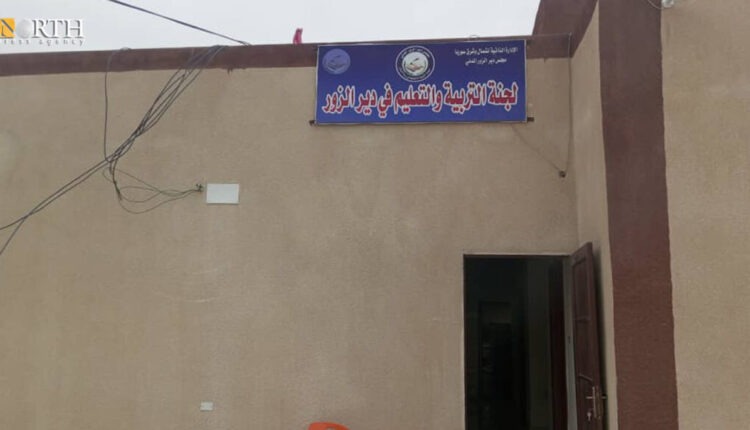
DEIR EZ-ZOR, Syria (North Press) – Ahmad recently came to know that his children are falling behind in their education. He is trying to fill in the gap, knowing it is a result of the weak schooling in his region.
Ahmad al-Salih, 40, from the village of al-Tar, 12 km west of Deir ez-Zor in eastern Syria, said that the education is not good and is being deteriorated in his region, which is held by the Autonomous Administration of North and East Syria (AANES).
The quality of education is declining due to incompetent teachers, lack of means of assistance, and too many holidays, especially in the second semester.
Al-Salih, father of six and owner of a shop in the village, said that two of his children are in school, but they cannot write or read.
He added that the low quality of education prompted parents to send their children to government-held areas. He demanded to enhance and better support the education sector in the region.
From time to time, people in Deir ez-Zor protest against the curriculum assigned by the AANES for schooling, and sometimes the teachers protest against the low salaries.
After establishing itself in northeast Syria in 2012, the AANES’ precursor introduced multilingual education. Today, Kurdish-majority areas have a Kurdish-based curriculum, with at least one class in Arabic, and vice-versa. Kurdish was also made co-official with Arabic on administrative level.
The AANES curriculum has also been controversial in more conservative areas of north and east Syria, such as Raqqa and Deir ez-Zor, where protestors have rejected progressive classes on ‘Jineoloji’ (or women’s science) and multi-religious education. The AANES has attempted to work with local councils to adapt curricula, though tensions remain.
Teachers in AANES-held areas are paid a salary of 520,000 Syrian Pounds (SYP, which equals about $ 63).
On April 29, the Education Board of the AANES extended the semester till the end of May because it was permeated with many official holidays.
Nur al-Meheimid, 35, from the village of Meheimideh, 11 km west of Deir ez-Zor, also believes the education sector needs support to improve the schooling process in the region.
She said the education sector in Deir ez-Zor needs to provide aid for facilitating the teaching of lessons in classes and to build new schools since most were destroyed in battles to push the Islamic State (ISIS) out of the region.
Al-Meheimid is concerned that her three children who go to school might have an accident, especially since the school has no fence. The majority of schools in Deir ez-Zor lack fences that protect and keep students at school.
Children in Deir ez-Zor are at risk of illiteracy because of the low quality of schooling at the time being and due to not attending schools in previous years under the rule of ISIS, which limited teaching to Sharia, excluding other subjects like mathematics, philosophy, biology and others.
Rawda al-Salem, a teacher from the village of Hamar al-Kasra, 22 km west of Deir ez-Zor, is to some degree pleased with the schooling these days compared to the time of ISIS’s control considering the number of schools they destroyed.
Nevertheless, she admits there are shortcomings in the teaching process. She believes it is due to a lack of expertise in the region in addition to the low number of schools opened by the Education Committee in Deir ez-Zor.
Schools in Deir ez-Zor lack educational materials such as seats and boards in addition to a lack of teaching aids such as maps, models, and others.
The schools lack sanitation that needs restoring, in addition to a lack of specialized teaching staff, especially in the middle and high school levels.
Ibrahim al-Saoud, the co-chair of the Education Committee in Deir ez-Zor affiliated with the AANES, said that since forming the committee in 2017, 739 schools have been opened. The number of students is estimated at 34,000 in all areas.
He added that 8,000 teachers in Deir ez-Zor were taught modern ways of teaching during the summer, and most of them have a high school diploma.
The Education Committee is currently offering all available means to elevate the level of schooling in addition to providing stationery, heating, and drinking water for all schools.
